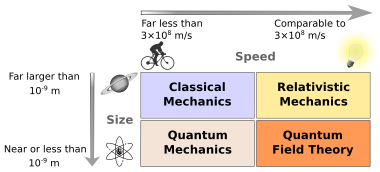Physics is the science of matter and its motion, as well as space and time. It uses concepts such as energy, force, mass, and charge. Physics is an experimental science, creating theories that are tested against observations. Broadly, it is the general scientific analysis of nature, with a goal of understanding how the universe behaves.
Physics is one of the oldest academic disciplines, and through its modern subfield of astronomy, it may be the oldest of all. Experimental physics Middle Ages and eventually emerged as a modern science during the early modern period. Those who work professionally in the field are known as physicists.
Advances in physics often translate to the technological sector, and often influence the other sciences, as well as mathematics and philosophy. For example, advances in the understanding of electromagnetism have led to the widespread use of electrically driven devices (televisions, computers, home appliances etc.); advances in thermodynamics led to the development of motorized transport; and advances in mechanics motivated and benefitted from the development of calculus, quantum chemistry, and the use of instruments such as the electron microscope in microbiology. The "Atomic Age" is also an important concept in philosophy and historical analysis.
Today, physics is a broad and highly developed subject. Research is often divided into four subfields: condensed matter physics; atomic, molecular, and optical physics; high-energy physics; and astronomy and astrophysics. Most physicists also specialize in either theoretical or experimental research, the former dealing with the development of new theories, and the latter dealing with the experimental testing of theories and the discovery of new phenomena. Despite important discoveries during the last four centuries, there are a number of unsolved problems in physics, and many areas of active research.
Branches of physics

Although physics encompasses a wide variety of phenomena, the fundamental branches of physics are classical mechanics, electromagnetism (including optics), relativity, thermodynamics, and quantum mechanics. Each of these theories has been tested in numerous experiments and proven to be an accurate model of nature within its domain of validity. For example, classical mechanics correctly describes the motion of objects in everyday experience, but it breaks down at the atomic scale, where it is superseded by quantum mechanics, and at speeds approaching the speed of light, where relativisticchaos theory was developed in the 20th century, three centuries after the original formulation of mechanics by Isaac Newton (1642–1727). The basic theories form a foundation for the study and research of more specialized topics.